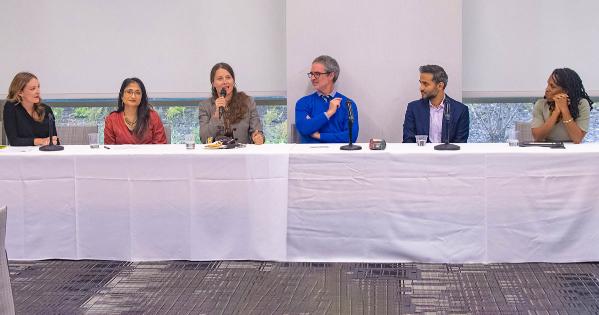American University Launches Center for Environment, Community, and Equity
There is a new center on American University’s campus ready to take action towards a more just and sustainable world.
On October 19, 2022, American University officially launched the Center for Environment, Community, and Equity (CECE). In what many describe as a “decade in the making,” CECE creates a network across the AU campus of people working in environmental studies to incubate innovative ideas, generate impactful and equitable actions, and prepare the next generation of thought leaders in the field.
The event’s keynote speaker was Maxine Burkett, deputy assistant secretary for oceans, fisheries, and polar affairs at the US Department of State. In her remarks, Burkett called for a commitment to environmental justice equal to that held by activists for other environmental issues like climate change and wildlife preservation.
“A commitment to the environment requires a commitment to justice,” declared Burkett. “The environment is where we live, where we work, where we play. Each of us has an environment in which we are deeply invested. And each of us should have an opportunity to determine its future.”
The need for a central AU effort toward this goal was explained by Simon Nicholson, SIS professor and CECE director, as less about changing AU’s focus and more about better organizing its activities: “At the moment, we are not having the environmental impact we ought to be having given the talented people at AU; we do not know each other. The Center is going to help fix that by building infrastructure to start working together on these issues.”
Diana Burley, vice provost for research and innovation at AU, underscored the need for the cross-campus collaboration that CECE provides: “The world doesn’t exist in disciplinary silos. We need to support multidisciplinary perspectives and work across school boundaries to address these real-world problems.”
While many centers around the globe are working to reduce the impacts of climate change, CECE is using its grant from the National Science Foundation to keep social justice and food equity at the forefront. Two SIS professors, Garrett Graddy-Lovelace and Malini Ranganathan, lead projects associated with the grant. Both attended the CECE launch, addressed the audience, and will work as part of its efforts toward environmental equity.
“There’s no such thing as an environmental issue that’s not deeply rooted in power imbalances, political economy, social constructs, diverse epistemologies, labor issues, and other racial and gender injustices,” stated Garrett Graddy-Lovelace, SIS professor and CECE associate director.
“Climate justice does not exist in a vacuum,” added Malini Ranganathan, SIS professor and CECE faculty affiliate. “There are compounding problems of structural racism in Washington, DC, that act as a threat multiplier to climate change and food insecurity in neighborhoods.”
But it’s not just faculty who are ready to help CECE prioritize climate justice, explained Sauleh Siddiqui, CAS professor and CECE associate director: “Our students demand this kind of work from us. It’s not just about the environment anymore; students want to know about the context of these issues and the people affected.”
One consistent message presented throughout the launch event was the need for community voices to lead research priorities. Acting on that commitment, CECE will host a research design workshop for AU faculty, grad students, and senior staff on October 29, 2022. Outcomes from this workshop will be added to CECE’s action plan, which includes an event in partnership with We Don’t Have Time on November 17, 2022, to discuss food justice and Indigenous sovereignties, and a summit March 3-6, 2023, in partnership with the Berkeley Food Institute and the Federation of Southern Cooperatives, on pointing the Farm Bill toward racial justice.
To learn more about the center and its upcoming events, visit the CECE website.

